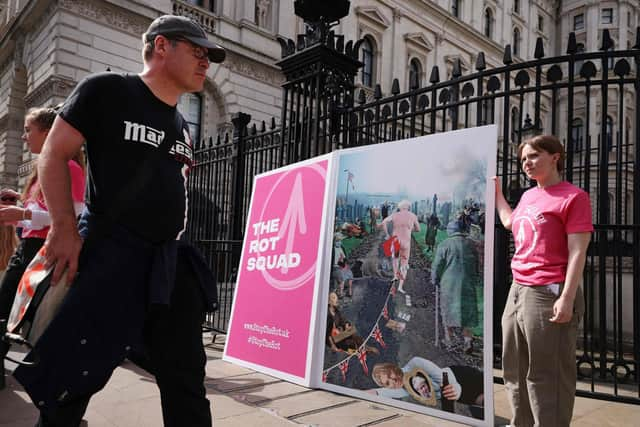People power can lead us out of darkness in cost of living crisis - Dani Garavelli
“We survived without double glazing,” they said. “It made us resilient.” It froze your heart, more like, mate. It stripped you of empathy, and occluded your powers of recall. Because, back in the heyday of a Greater Britain, when families huddled in front of one-bar electric fires, illness was rife and children and OAPs perished: of asthma, heart attacks, pneumonia.
They still do. Even now, not all homes are adequately heated, and fuel poverty has never disappeared. Still, excess winter deaths more than halved between the 1950s and the 2010s. How chilling it is to think they may rise again.
Advertisement
Hide AdAdvertisement
Hide AdThe warning signs are unmistakable. As the energy cap rises to a staggering £3,549 per year for dual fuel for an average household, charities are all saying the same thing: lives will be lost. Boris Johnson’s talk of buying a kettle to save £10 a year is further evidence of the Tory party’s detachment from real life. But those on the ground know the truth; and they cannot contemplate it with anything but dread.


Contrast Johnson’s blithe idiocy to the distress of the dinner lady who last week said she was having to refuse food to more and more pupils because their parents couldn’t afford to top up their accounts. That woman understood hunger, but also humiliation. “Something has to give,” she said, her voice breaking, “and I don’t think it should be children’s spirits.”
At Simon Community Scotland’s access hub in Glasgow, head of service Ashley Young says staff are seeing the same desperation. For years, their role has been to help those on the margins into tenancies; but now many people are too scared to take them on. In hostels, their gas and electricity costs are covered. Why would they forsake that for a flat they can’t afford to heat?
It’s not just single men, either. Last week, two families turned up, babies and toddlers in tow. “They had no food, no nappies, no wipes,” Young says. The children were crying with hunger. They said if we couldn’t help them, they’d beg in the street.”
There is too much unanimity amongst those on the frontline to dismiss their forecasts as scaremongering. Save the Children says we’re on the brink of a humanitarian crisis, the Joseph Rowntree Foundation (JRF) that stratospheric bills will push single adults into destitution, the Resolution Foundation that more than half of households will be in fuel poverty by January.
We are in this state because of political failures. Oil and gas prices have surged due to the war in Ukraine, but successive UK governments have spent decades failing to mitigate against just such an eventuality.
Despite paying lip service to climate change, they have not done enough to force a shift from oil and gas to renewables or to better insulate the country’s energy-inefficient housing. As a result, the International Monetary Fund (IMF) says, British households will be the hardest hit in western Europe.
Conservative ministers have spent months twiddling their thumbs as they waited for the leadership election. Johnson’s attempt to blame Labour for failing to invest in nuclear power after 12 years of Tory governments was embarrassing. His 11th hour announcement of multi-billion pound funding for Sizewell C nuclear power station in Suffolk appeared to have been motivated mostly by thoughts of his legacy and a desire to limit his successor’s “economic vision”.
Advertisement
Hide AdAdvertisement
Hide AdNext week’s decision is unlikely to improve matters. If Liz Truss wins, she is going to make Johnson look like a towering intellect. Her support packages and promises of tax cuts may help some families short-term, but she lacks the vision required to drag the country from the abyss. Scotland’s First Minister Nicola Sturgeon, meanwhile, appeared distracted by the Edinburgh Festival, only intervening to sort out the bin and school strikes once the tourists had gone home.
All the radical thinking is coming from outwith politics. Campaigners at organisations such as Uplift and the JRF are pushing for higher taxation of the energy companies, with funds used to protect ordinary people from destitution and invest in renewables.
Activists, too, are making their mark: the strikers, of course, and members of Enough is Enough, who are taking part in protests around the country. What form of rebellion will prove most effective is still being debated. In the 1980s, the Can’t Pay, Won’t Pay campaign ended the poll tax. But energy companies have the power to make life more difficult than local authorities. Would withholding payments result in power being disconnected, leaving the lowest-paid at greater risk?
Yet people power is already having an impact. Last week, three unions scored a victory for councils’ lowest paid workers. They had previously rejected offers of a 3.5 per cent, then 5 per cent, pay rise on the grounds the better-paid would gain the most. Now they have recommended their members accept a new offer which represents an increase of about 10 per cent for the lowest paid. Those earning between £39,000 and £60,000 will get 5 per cent. This offer was made after the SNP government agreed to provide £260.6m of the annual cost.
Where one strike succeeds, others will follow. Perhaps, after all, we are not helpless. Though the times are bleak, and the world uncertain, it feels as if we are relearning something we once took for granted: that the answer to our problems lies not with politicians; but in trade unions, grassroots activism, and the solidarity of workers.